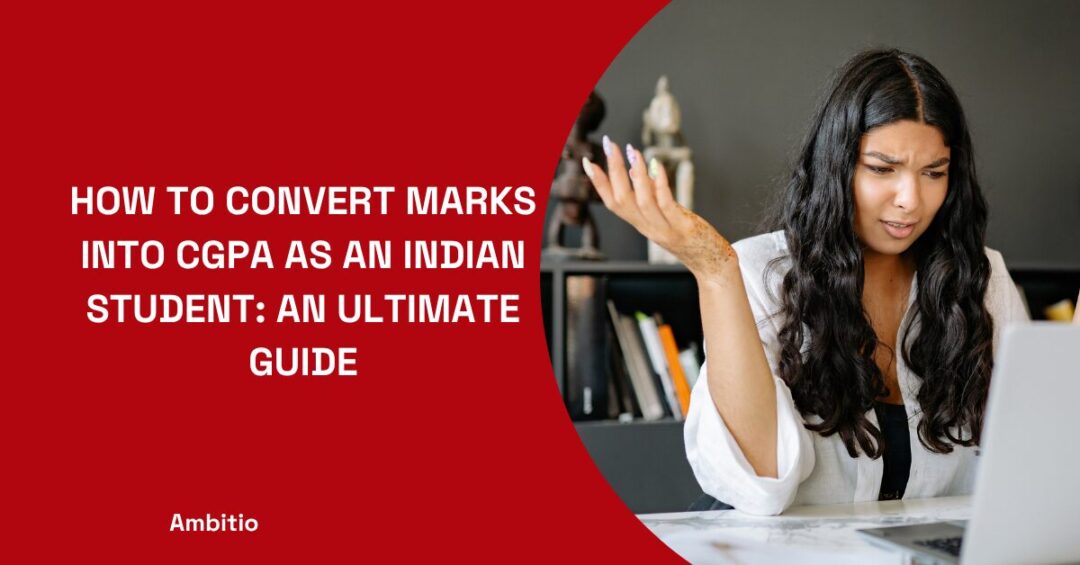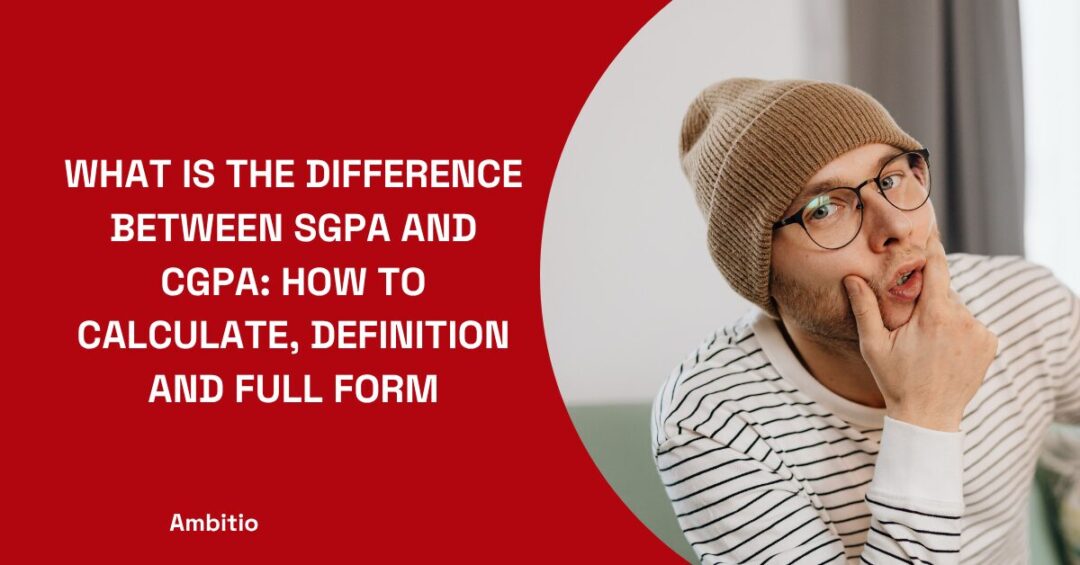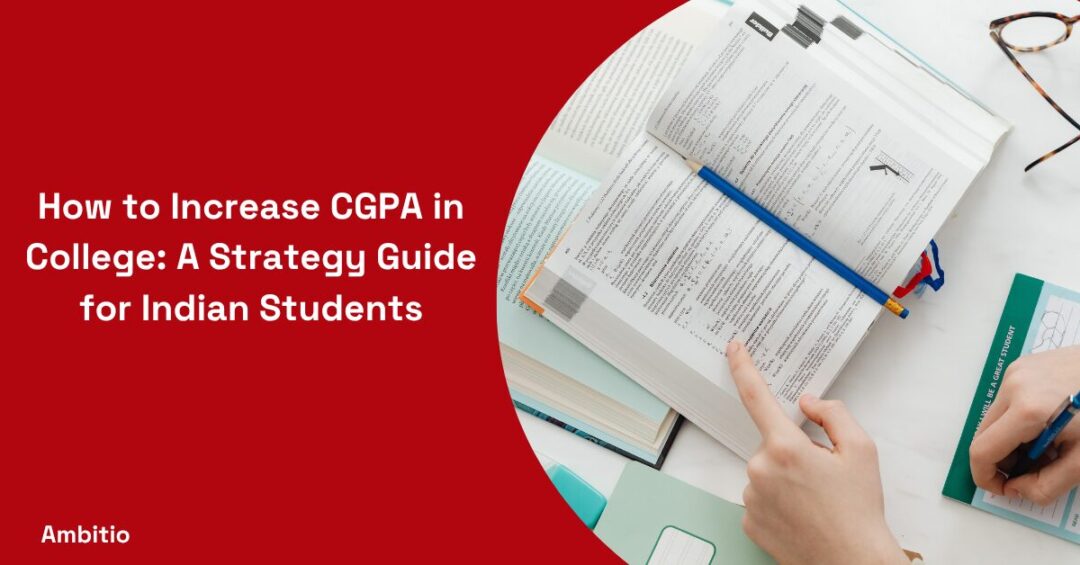11 July 2025
7 minutes read
Average Undergrad GPA for Law School: A Guide for Indian students
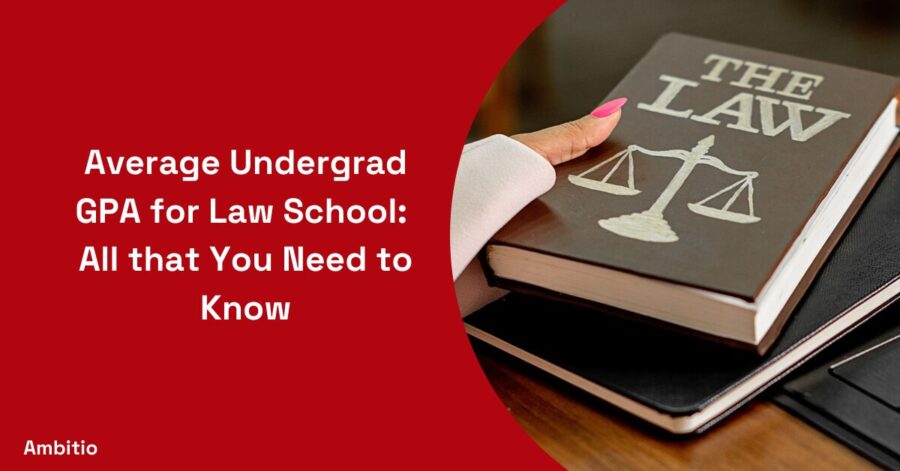
Key Takeaways
- Average undergrad GPA for law school varies, but top programs require around 3.7-3.9, while many law schools take applicants with lower GPAs.
- A GPA below 3.0 may limit options, but strong LSAT scores, experience, and a compelling personal statement can improve admission chances.
- The average undergrad GPA for law school differs by institution, so researching specific programs’ admission criteria is crucial for applicants.
As you seek admission to get into law school and begin your career as a lawyer, your undergraduate GPA is something to consider. Law schools consider your record in class as but one factor among several. Throughout the course of this detailed guide, we shall look at why your GPA matters, average GPAs of law school applicants, and how you can optimize your chances for admission to your dream law school.
What is the Ideal GPA for Top Law School Admissions?
The best GPA for different law schools varies by school and competitiveness. While highly rated schools will require a high GPA, the majority of law schools accept many students with some of the lowest GPA, including the ones below 3.0, especially if they have high LSAT scores, professional experience, or good personal statements.
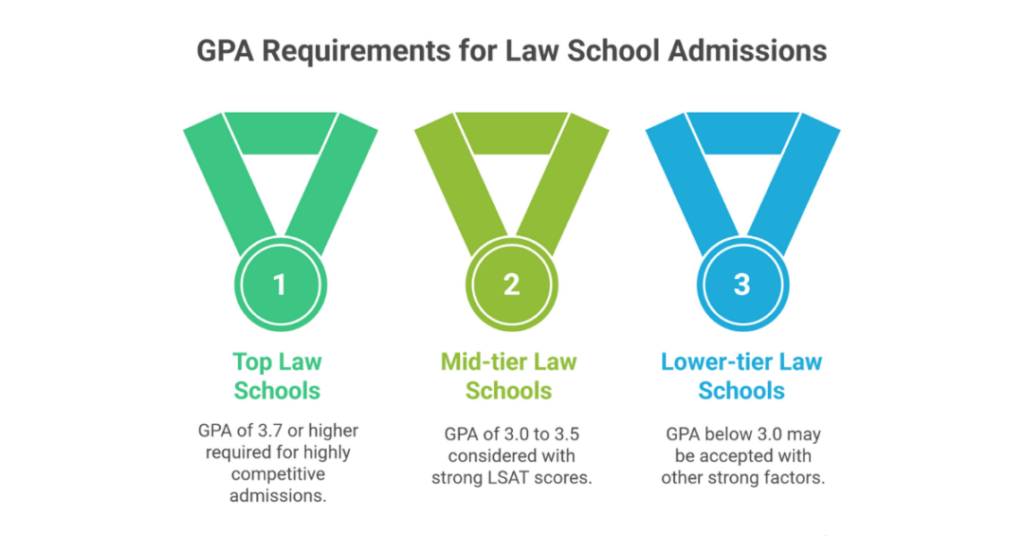
However, the higher the GPA, the more likely are the chances for you to get into a top law school.
1. Top Law Schools
If you wish to attend a highly rated law school, you’ll typically require a 3.7 or higher undergraduate GPA. They are highly competitive and they prefer select candidates with very strong academic backgrounds.
Top law schools not only demand high grade point but also pay greater attention to the LSAT (Law School Admission Test) score. Your application should preferably have a mix of good GPA and competitive LSAT score to get admission in these top-ranked institutions.
2. Mid-tier Law Schools
Low-to-mid-level law schools might consider students with GPAs from 3.0 to 3.5. Strong LSAT score and other achievements can make up for a lower GPA.
It should be noted that mid-range law schools have the ability to provide good learning opportunities and career opportunities. A few successful lawyers have graduated from such institutions. So, if your GPA is within this range, attempt to make other sections of your application strong, i.e., work or employment experience, letter of recommendation, and personal statement.
3. Lower-tier Law Schools
Certain less competitive law schools might accept students with GPAs lower than 3.0. Still, it is important to study each school individually and determine if attending such an institution is conducive to your professional aspirations.
Though lower-tier law schools might offer less stringent GPA requirements, note that they can have fewer resources and networking contacts than higher-tier schools. Be sure to carefully consider your options before making a decision.
How Law Schools View Your GPA?
Your GPA is not a number; it is an evaluation of your track record of accomplishment during your undergraduate years.
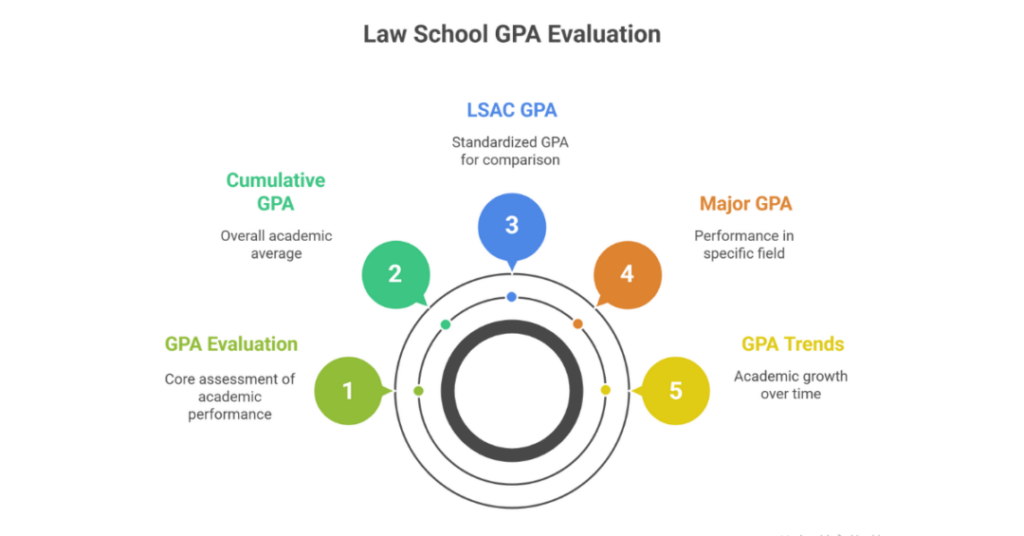
Admission committees look at your GPA from several points of view:
1. Cumulative GPA
Your cumulative GPA is the accumulated average of all of your work taken as an undergraduate. Admission committees use this as a rough guide to your capacity to succeed at academics.
2. LSAC GPA
Law School Admission Council (LSAC) calculates an equalized GPA for everyone who applies. It is perhaps slightly different from your institution’s GPA because LSAC computes it separately. This equal GPA enables law schools to compare candidates evenly.
3. Major GPA
Some law schools look at your GPA in your major, especially if it relates to your intended field of study in law. If your major GPA is stronger than your overall GPA, it will be in your favor.
4. Trends in GPA
Law schools can also evaluate your academic path. They would like to notice improvement or steadiness over time in your grades. If you had a bumpy beginning but improved drastically in later years, be sure to point this out in your application.
Law School Rankings and Median GPA Required to Go to Law School
Law school rankings can make a big difference in your career opportunities later on. Elite law schools usually have more lucrative job prospects as well as networking opportunities.
Most of the top schools demand high GPAs. To have a good chance to enter a highly-ranked law school, have a GPA of over 3.7 and pair it with a strong LSAT score.
1. The Role of Rankings
Rankings are tied to a weighted combination of some or all of many different elements, including reputation, faculty, placement rates when students graduate, and student/faculty ratio. They do likely affect the applicant’s job opportunities and earning power later on.
2. The Obsession with T14
The “T14” are the highest-ranked 14 law schools in America, and prospective law students fantasize about being accepted at one of these elite schools. These schools are well-respected and highly competitive. In order to have any hope of being accepted at a T14 school, you’ll have a GPA of 3.7 or higher, along with a great LSAT score.
3. Think About Your Career Goals
In comparing law schools, applicants should not simply look at ratings. Consider your career objectives and what specific programs and facilities each school can provide. A lower-ranked school with an excellent program in your area of interest may be preferable to your goals.
Can You Improve Your GPA for Law School (High GPA and LSAT Score Tips)?
If your GPA is poor and you’re considering attending law school, don’t give up. All hope is not lost. Take the following advice to improve your chances:
1. LSAT Score
A good score in LSAT can offset a poor GPA. Prepare hard for the LSAT and obtain a high score. There are many study guides and test prep courses to choose from.
2. Obtain Relevant Work Experience
Gaining the same work experience will demonstrate your dedication and knowledge of the law. Many law schools take paralegal experience, clerkships, and internships, which can all be used to strengthen your application.
3. Consider Writing an Addendum
If you have a good reason for a low GPA, i.e., illness or personal problems, consider writing an addendum explaining your circumstances. Keep it brief and honest in your answer, and show how you have learned and solved problems.
4. Pursue Postgraduate Studies
A postgraduate degree or additional course work can demonstrate your intellectual abilities and interest in your field of study. It may also be an opportunity to boost your GPA before law school.
5. Target Schools That Match Your Profile
Seek law schools that are a best match for your future professional career and academic record. There are some law schools that are not so much interested in GPA but rather in other areas, such as professional experience and personal statement.
Median GPA for the Top 14 Foreign Law Schools
When it comes to a law school application, your GPA score plays a crucial role. Many students ask, “What GPA do you need to get into a dream school?” or “Can I get into a law school with a low GPA?”
The truth is, while low grades might make your journey harder, they don’t make it impossible, especially if you know which schools in the US and abroad focus on holistic profiles. Let’s take a look at the median GPA for the Top 14 foreign law schools, so you can figure out where you stand and what to aim for
| Law School | Country | Median GPA | GPA Range Accepted | Remarks |
|---|---|---|---|---|
| University of Oxford | UK | 3.7 | 3.5 – 4.0 | Highly competitive, looks beyond just GPA; strong academics expected. |
| University of Cambridge | UK | 3.75 | 3.6 – 4.0 | Considers academic writing and law aptitude tests like the CLT. |
| University of Toronto | Canada | 3.85 | 3.7 – 4.0 | One of the most selective law schools in Canada. |
| McGill University | Canada | 3.6 | 3.3 – 3.9 | Bilingual program; considers holistic profile including undergraduate degree. |
| University of Melbourne | Australia | 3.7 | 3.4 – 3.9 | Emphasis on academic rigor and legal aptitude. |
| National University of Singapore | Singapore | 3.8 | 3.6 – 4.0 | One of Asia’s toughest law programs to get into. |
| University of Hong Kong (HKU) | Hong Kong | 3.6 | 3.3 – 3.9 | Accepts international applicants with strong overall profiles. |
| Leiden University | Netherlands | 3.5 | 3.2 – 3.8 | GPA flexible; considers performance in law school and extracurriculars. |
| KU Leuven | Belgium | 3.4 | 3.1 – 3.8 | Strong research background is a bonus; English-taught LLMs available. |
| University of Sydney | Australia | 3.65 | 3.3 – 3.9 | Global recognition; holistic profile important. |
| University College London (UCL) | UK | 3.7 | 3.4 – 3.9 | Competitive admissions; GPA not the only factor. |
| Trinity College Dublin | Ireland | 3.5 | 3.2 – 3.8 | Accepts school applications from a variety of academic systems. |
| University of Auckland | New Zealand | 3.4 | 3.1 – 3.7 | Good choice for those with low GPA scores but strong references. |
| University of Edinburgh | UK | 3.6 | 3.3 – 3.9 | Emphasizes ability to succeed in law over perfect GPA. |
Even if your GPA is below 3.0, it’s not game over. Many schools consider your combined GPA, graduate GPA, LSAT scores, personal statements, and more. Remember, law schools want applicants who show potential to succeed in law school, not just those with a 3.8 GPA.
So if you’re aiming for a school like Yale Law School, you’ll need to improve your GPA, but don’t give up if you can’t. Your GPA might not be set in stone, and the right strategy can help you get admitted even to a school with a low GPA.
Conclusion
In summary, your undergraduate GPA is an important aspect of your application to law school, but it is not the only factor. Although numerous students apply to law schools, they take into account several other variables as well, so a whole-person approach to your application is necessary. Aim for the best possible GPA, but don’t neglect your LSAT score, work history, and personal statement in an effort to improve your opportunities of being admitted into the law school of your choice. Keep in mind that law school and legal career success really come down to your work ethic and commitment to the profession. Best wishes on your path to becoming a legal professional!
All set to study abroad? Join Ambitio Elite and take your dreams to new heights!
FAQs
What is the average undergrad GPA for law school?
Most top law schools require a GPA of 3.7-3.9, but many law schools take applicants with lower GPAs.
Can I get into law school with a GPA below 3.0?
Yes, but you may need a high LSAT score, strong extracurriculars, and a compelling personal statement to boost your chances.
What is the lowest GPA law schools accept?
Some schools consider applicants with a GPA below 3.0, especially if they have strong LSAT scores or work experience.
How important is the average undergrad GPA for law school admissions?
GPA is a key factor, but LSAT scores, recommendations, and personal statements also influence admission decisions.
Do law schools look at overall GPA or major GPA?
Most law schools assess overall GPA, but a strong major GPA in challenging coursework can positively impact your application.
Can work experience compensate for a low undergrad GPA in law school applications?
Yes, significant professional experience can strengthen your application, especially if paired with a strong LSAT score.
How can I improve my law school chances with a low GPA?
Scoring high on the LSAT, gaining legal experience, writing a strong personal statement, and securing solid recommendations can help.

You can study at top universities worldwide!
Get expert tips and tricks to get into top universities with a free expert session.
Book Your Free 30-Minute Session Now! Book a call now















